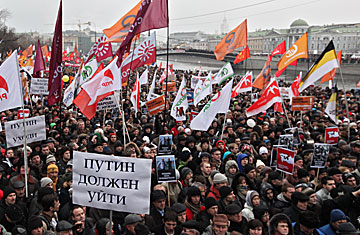
Russians stage a protest against alleged vote rigging in parliamentary elections, holding signs including one that reads "Putin Must Go Away," on Dec. 10, 2011 in Moscow
(2 of 2)
The brightest response to the crisis from the government side is typical of Putin's system of managed democracy. The ruling party wants to engineer a liberal party to channel the energy of the young, educated and middle-class voters attending the latest demonstrations. "This is a gaping hole in the system," the United Russia official said. "We have no party that can absorb this part of society." Last summer, the Kremlin already attempted to create such a party, Pravoe Delo (Right Cause), by tapping the billionaire owner of the New Jersey Nets, Mikhail Prokhorov, to run it. But he did not prove sufficiently loyal. As that party's list of candidates for the parliamentary vote was being formed, Prokhorov began pushing through his own men instead of accepting orders handed down from above. The reaction was swift, and revealed the Kremlin's almost pathological fear of competition. In September, Prokhorov was unseated as the leader of the party, a coup he blamed on the Kremlin's "puppet master," Vladislav Surkov, who has overseen the media and national politics throughout Putin's rule. Most of the protest votes in the elections then ended up going to the Communist Party, which got 19%, even though Russia's urban middle-class youth hardly wants to see it returned to power. Both the Communist speakers at Saturday's rally got a cold reception from the crowd; one was booed off stage.
It is far from clear, however, that another Kremlin puppet party, no matter how liberal and democratic its rhetoric, would satisfy demands for real democratic reform. The organizers of the protests, most of whom belong to unregistered opposition parties, demanded that they be allowed to take part in elections for the first time — a risk that United Russia might consider taking, the official told TIME. "At first we'd like to have them take part in some discussion club. They send their men, we send ours. And maybe later, in time for the next elections, they might get registration," which would allow them to field candidates.
But these half measures have so far inspired only anger among Russia's disaffected voters. On Sunday, President Dmitri Medvedev offered another minor concession via his Facebook page, saying he had ordered all claims of voter fraud to be investigated. Within hours, the post had more than 7,000 comments, many of them deriding Medvedev as a "pathetic" President or repeating the opposition's insistence on new elections.
If the demand for a new election is not met within two weeks, the opposition says, it will hold another mass demonstration in Moscow and other cities in the hope of forcing the government to negotiate. "They thought we couldn't even get 10,000 people to rally, and now we've showed them," Ilya Ponomaryov, the parliamentary deputy who led the Saturday rally alongside Ryzhkov, told TIME afterward. "We have enormous momentum. The people are fed up. The authorities spit in their face with these elections, and they are spitting back. So I think, yes, Putin will have to negotiate."
But for a man who has only ever shown contempt for Russia's banned opposition groups and who has ruled unchallenged for a decade, it would be painful and humiliating in the extreme to sit down and discuss their demands. It would seem easier, and more in line with his character, to side with the faction inside his party that is clambering for a crackdown. And that is when Russia's snowy revolution could suddenly turn into a bloody one.
